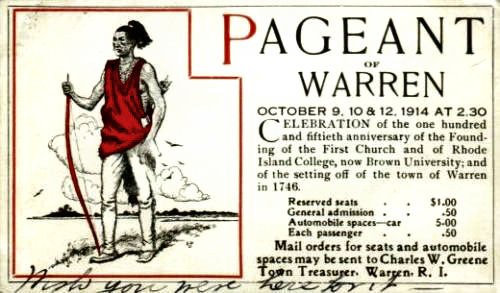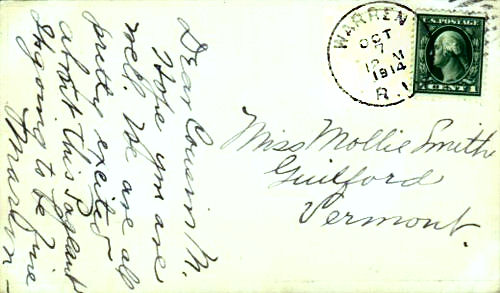![]()
Postal History Introduction
Stampless
Covers
1846
to 1900 Issues
1901-1950
Issues
1951-2003
Issues
Cancels
&
Miscellaneous
Postal
Stationery
Post
Cards
Air
Mail
First
Day &
Event Covers
Parcel Post/Special Delivery
Registered & Official Mail
Commercial & Advertising
Revenue & Postage Due
Wildlife & Game Issues
Complete List of RI Issues
|
Rhode Island
Illustrated Event Covers |
|
|
|
|
|
|
The Post Card Above was produced by the town of Warren, (Bristol County) Rhode Island to commemorate the 150th Anniversary of the founding of Rhode Island College, (Brown University), founding of the first Church in Warren and the setting off of the town. The card is canceled with an October 7, 1914 Warren Duplex and bears a 1 cent dark green, (Scott #405) Washington definitive stamp issued on February 12, 1912. The card was sent to Miss Mollie Smith of Guilford, Vermont on October 7, 1914. The message on the reverse
reads: The Face of the card shows a Native American of the Narragansett Tribe, states the fees for seats and parking, and gives the name of Charles W. Greene, Town Treasurer as the Point of Contact for mail order reservations. Charles Whipple Greene was born on August 14, 1864 in Bristol, Rhode Island. He was married to Mary G. Greene of Massachusetts and had two daughters named Charlotte and Alice. He was the 6th child of George Thomas Greene and Maria Munroe Greene and was a 10th generation descendent of Surgeon John Greene, who was born at Bowridge Hall, in Gillingham, Dorsetshire, England. in 1597 and left Boston for Rhode Island in 1638 with Roger Williams. John was the first doctor in the state of Rhode Island. Charles W. Greene is also listed as a member of the Rhode Island State Senate in 1911. There is a museum in Warren located on Main Street that is named "Charles W. Greene Museum" and currently houses the Charles R. Carr collection of Pre-Columbian, Peruvian and North American Indian artifacts. The museum also features exhibits on colonial fishing and farms. Warren is the twenty-sixth largest town in the State of Rhode Island and is situated on Mount Hope Bay and the Warren River. Rhode Island College, (renamed Brown University after Nicholas Brown, Jr. - one of the first graduates) was founded there in 1746, and the university's first commencement was held there before the school was moved to Providence. Warren was originally settled in the mid 17th century and in 1653, contained only 18 homes. The town has 11 churches, more than 30 restaurants and has a population of 11,500. It was incorporated into the State of Rhode Island in 1746 and was formerly a part of Swansea, Massachusetts. The town was named for for Sir Peter Warren who commanded the British Fleet that captured Louisburg during the French and Indian Wars. Warren was burned and pillaged during the Revolutionary War. The city was engaged early on in the maritime trades and in the whaling industry. During the mid 19th century, the textile industry flourished and the city became more ethnically diverse; welcoming immigrants from Canada, Ireland, Italy, Poland, and Portugal. Blount Shipyard, (built several of the Block Island ferries) is located in the town. The first Post Office in Warren was established around 1791-92, (The first official records date to July 31, 1792). The first Postmaster of record was Nathaniel Phillips. The Post Office is currently in operation. |
![]()
RI Historical
Society
The Post Offices
Home Page
RI Tercentenary Issue History
RI Philatelic Society
Recently Added Pages
Philatelic Primer
Rhode Island Around the World
Rhode Island
Town Postmarks
Other Websites of Interest

